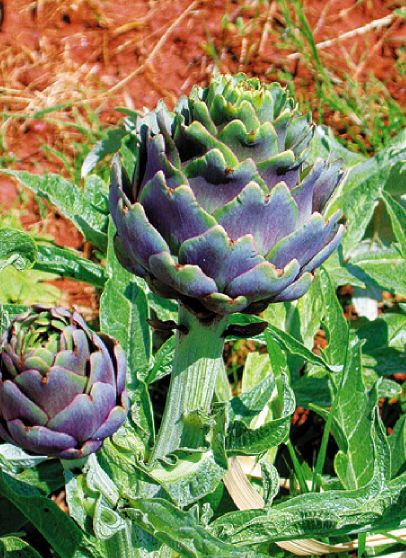|
|
Ouzo--the Greek Grappa
by Marianthi Milona
|
WHAT are the mezes, the famous Greek appetizers, or any other meal in Greece, without a little glass of ouzo right at the beginning? It's like saying to your friends: "Calm down for a while and tell me what happened to you today." What an offer! And to be true: not really typical Greek. If we take a view through culinary southern Europe, we can find a lot of similar drinks.
|
Anise-flavoured spirits have been widespread throughout the Mediterranean area probably ever since the days of Byzantine rule, and almost everywhere they enjoy the status of a national drink: raki in Turkey, sambuca and grappa in Italy, and pastis, especially in southern France, to name but a few. In this case, as with many herb-flavoured spirits, the original idea behind it may have been to capture and preserve in alcohol the effectiveness of a valued medicinal herb, as anise (Pimpinella anisum) had already reached Greece from the Orient in ancient times by way of Egypt and Crete, and was equally valued as both a herb and a medicine. If ouzo and tsipouro, which is also an anise-flavoured Greek spirit, were originally distilled in small concerns and by Greek winegrowers trying to augment their meagre incomes a little, production now takes place in large distilleries all over Greece. Ouzo production on the northern Aegean island of Lesvos, for example, can be considered to exemplify the highest level of the distillers' art. Each company has its own production methods and uses its own carefully guarded recipes.
|
 A tourist drinks ouzo at a bar in Athens'
A tourist drinks ouzo at a bar in Athens'
historic Plaka district
|
Ouzo is based on pure alcohol from various sources. It could, for instance, be a distillation of molasses produced during sugar manufacture. The alcohol is diluted with water, then the herbs are added. As well as the obligatory anise, these can also include fennel seeds, star aniseed, coriander, cardamom and others. In the case of Lesvos, a trace of mastic is also part of the recipe. This mixture is left to stand overnight, so the herbs can release their flavours into the mixture of water and alcohol. On the next day it is distilled several times in huge copper vats (distillation tanks). Copper provides the best conditions for distillation, as it guarantees an even temperature in the container, which is of absolutely crucial importance for the way the aroma develops in any distilled product. The first part of the distillation is called the forerun or head (Greek kefali). The result will not be satisfactory, especially as at this stage the substances which give it its aroma and flavour have not yet been able to develop to the full and they will be collected for a second distillation, just as they will in the after run, or tail (Greek oura). Isolating the middle run, the heart or kardia is the true art of the distiller, as both the forerun and afterrun already contain elements affecting the taste. The heart is also distilled a second time, and then finally adjusted to the correct grade of alcohol using distilled water.
Drinking ouzo everywhere in Greece
Every region of Greece produces its own ouzo. The most famous comes from the north Aegean island of Lesvos, which has the oldest tradition of ouzo production. The crucial factors are the water quality, the origin of the herbs and how much of each is added. Mini is an ouzo from the EPOM company and at 40 percent alcohol is one of the milder ouzos from Lesvos. Ouzo Mageia is a lower-quality, more regionally distinctive ouzo from the mainland. Ouzo Plomariou is the most famous ouzo from Lesvos and has unique corks. It has now been bought by Ouzo 12 and is also marketed abroad. Ouzo Apallarina is a local ouzo from the neighbouring island of Hios, and provides no more competition for the Lesvos ouzo than does Ouzo Athenée. Ouzo Babatzim is a Macedonian ouzo of the highest quality, produced according to hygiene regulations, flavoured with fresh herbs and filtered during the three-part distillation. Ouzo Barbayanni is the first class Lesvos ouzo, a 45 percent spirit, which follows an old recipe. Ouzo 12 from Macedonia is the ouzo which is best known outside Greece. It is produced from alcohol that is bought in ready-made and herbal essence, so Greeks describe it as ouzo from the chemistry lab.
Stin ygeia sas! [To Your Health!]
* Marianthi Milona is the author of the book Culinaria Greece
|
(Posting date 6 March 2008)
HCS readers can view other excellent articles by the Athens News writers and staff in many sections of our extensive, permanent archives, especially our News & Issues, Travel in Greece, Business, and Food, Recipes & Garden sections at the URL http://www.helleniccomserve.com./contents.html
Readers enjoying these articles may wish to subscribe to the Athens News by visiting the website and following online directions at http://www.athensnews.gr.
All articles of Athens News appearing on HCS have been reprinted with permission.
|
|
|
|
2000 © Hellenic Communication Service, L.L.C. All Rights Reserved.
http://www.HellenicComServe.com
|



